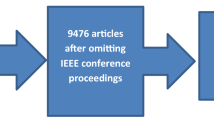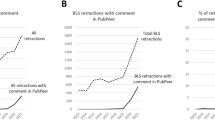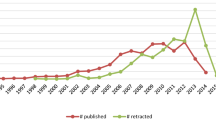Abstract
Recent cases of unethical publication behavior have raised the question of how to address it. Because scientific misconduct (conduct inconsistent with accepted scientific standards) can occur on a continuum ranging from honest errors to outright fraud, there is a need to change editorial policies to reduce the existence of any gray areas. In the case of quantitative empirical research, misconduct begins with honorary and ghost authors, plagiarism and self-plagiarism, and extends to manipulation or even fabrication of data and the reporting of biased or false results. It is suggested that journals should retract articles, inform retraction watch more frequently, use plagiarism software, ask for better and more detailed documentation of procedures so that research can be replicated and potentially analysed as manipulation, and reveal possible affiliations that might lead to biases. These policies will also facilitate faster learning, which will be beneficial to society.
Similar content being viewed by others
References
Albers S (2009) Editorial: well documented articles achieve more impact. BuR Bus Res 2(1):8–9
Albers S (2012) Optimizable and implementable aggregate response modeling for marketing decision support. Int J Res Mark 29(2):111–122
Albers S, André B (2012) Wovon hängt die Leistung in Forschung und Lehre ab? Eine Analyse deutscher betriebswirtschaftlicher Fachbereiche basierend auf den Daten des Centrums für Hochschulentwicklung und des Handelsblatts, Arbeitspapier, Kühne Logistics University, Hamburg
Anderson RG, Greene WH, McCullough BD, Vinod HD (2008) The role of data/code archives in the future of economic research. J Econ Methodol 15(1):99–119
Auspurg K, Thomas H (2011) What fuels publication bias? Theoretical and empirical analyses of risk factors using the caliper test. Jahrbücher für Nationalökonomie und Statistik 231(5–6):636–660
Bauer J, Jochen G (2011) Difficulties detecting fraud? The use of Benford’s law on regression tables. Jahrbücher für Nationalökonomie und Statistik 231(5–6):733–748
Benford F (1938) The law of anomalous numbers. Proc Am Philos Soc 78(4):551–572
Committee on Publication Ethics (COPE) (2011) Code of conduct and best practice guidelines for journal editors. http://www.publicationethics.org
Cossette P (2004) Research integrity: an exploratory survey of administrative science faculties. J Bus Ethics 49:213–234
Desai PS (2013) Editorial: marketing science replication and disclosure policy. Mark Sci 32(1):1–3
Deutsche Forschungsgemeinschaft (1998) Proposals for safeguarding good scientific practice. Wiley-VCH, Weinheim
Diekmann A (2011) Are most published research findings false? Jahrbücher für Nationalökonomie und Statistik 231(5–6):628–635
Erasmus University (2012) Report by the committee for inquiry of scientific integrity. Inquiry into a possible violation by Dirk Smeesters, 28 June 2012
Evanschitzky H, Baumgarth C, Hubbard R, Scott Armstrong J (2007) Replication research’s disturbing trend. J Bus Res 60(4):411–415
Fanelli D (2009) How many scientists fabricate and falsify research? A systematic review and meta-analysis of survey data. PLoS ONE 4(5):e5738
Fanelli D (2012) Negative results are disappearing from most disciplines and countries. Scientometrics 90:891–904
Flanagin A, Carey LA, Fontanarosa PB, Phillips SG, Pace BP, Lundberg GD, Rennie D (1998) Prevalence of articles with honorary authors and ghost authors in peer-reviewed medical journals. J Am Med Assoc 280(3):222–224
Frenzen H, Hansen A, Krafft M, Mantrala MK, Schmidt S (2010) Delegation of pricing authority to the sales force: an agency-theoretic perspective of its determinants and impact on performance. Int J Res Mark 27(1):58–68
Fung R (2010) Data anomalies within the management literature, working paper. http://ssrn.com/abstract=1554684
Goodstein D (2010) On fact and fraud. Cautionary tales from the front lines of science. Princeton University Press, Princeton
Haucap J (2012) BWL: Kein Ranking ist auch keine Lösung. Ist die Wirkmächtigkeit des Handelsblatt-Rankings so groß, dass man es boykottieren muss? Handelsblatt
Honig B, Bedi A (2012) The fox in the hen house: a critical examination of plagiarism among members of the academy of management. Acad Manag Learn Educ 11(1):101–123
Journal of Economic Perspectives (2011) Correspondence between editor autor and author Frey. J Econ Perspect 25(3):239–240
Kieser A (2012) JOURQUAL-der Gebrauch, nicht der Missbrauch, ist das Problem. Oder: warum Wirtschaftsinformatik die beste deutschsprachige betriebswirtschaftliche Zeitschrift ist. Die Betriebswirtschaft 72(1):93–110
Koole SL, Daniël L (2012) Rewarding replications: a sure and simple way to improve psychological science. Perspect Psychol Sci
Kumar MN (2010) A theoretical comparison of the models of prevention of research misconduct. Account Res 17:51–66
Lacetera N, Zirulia L (2011) The economics of scientific misconduct. J Law Econ Organ 27(3):568–603
List CJ (1985) Scientific fraud: social deviance or the failure of virtue? Sci Technol Hum Values 10(4):27–36
Luce MF, McGill MA, Peracchio L (2012) Promoting an environment of scientific integrity: individual and community responsibilities. J Consum Res 39(3):iii–viii
Martinson BC, Anderson MS, de Vries R (2005) Scientists behaving badly. Nature 435:737–738
McCullough BD, McGeary KA, Harrison T (2006) Lessons from the JMCB archive. J Money Credit Bank 38(4):1093–1107
McCullough BD, McGeary KA, Harrison TD (2008) Do economics journal archives promote replicable research? Can J Econ 41(4):1406–1420
Nosek BA, Jeffrey RS, Matt M (2012) Scientific utopia: II. Restructuring incentives and practices to promote truth over publishability. Perspect Psychol Sci
Nylenna M, Sigmund S (2006) Scientific misconduct: a new approach to prevention. Lancet 367:1882–1884
Resnik DB, Stewart CN (2012) Misconduct versus honest error and scientific disagreement. Account Res Polic Quality Assur 19(1):56–63
Schrader U, Hennig-Thurau T (2009) VHB-JOURQUAL2: method, results, and implications of the German academic association for business research’s journal ranking. BuR Bus Res 2(2):180–204
Schräpfler J-P (2011) Benford’s law as an instrument for fraud detection in surveys using the data of the socio-economic panel (SOEP). Jahrbücher für Nationalökonomie und Statistik 231(5–6):685–718
Simmons JP, Nelson LD, Simonsohn U (2011) False-positive psychology: undisclosed flexibility in data collection and analysis allows presenting anything as significant. Psychol Sci XX:1–8
Simonsohn U (2012) Just post it: the lesson from two cases of fabricated data detected by statistics alone, working paper. http://ssrn.com/abstract=2114571
Storbeck O (2012) BWL-Professor gerät ins Zwielicht. Fehler und Ungereimtheiten—Zeitschriften ziehen Studien des Mannheimer Forschers Ulrich Lichtenthaler zurück, Handelsblatt
Tilburg University (2011) Interim report regarding the breach of scientific integrity committed by professor D. A. Stapel, Tilburg, 31 Oct 2011
Verein für Socialpolitik (2012): Ethikkodex des Vereins für Socialpolitik, Fassung vom 21. Juli 2012. http://www.socialpolitik.org/inhalte/Ethikkodex_final.pdf. Accessed 16 Oct 2012
Warnecke H-J (2000) Erklärung des Präsidenten der FhG, Forschung and Lehre, 2/2000, 90
Wondracek G, Holz T, Kirda E, Kruegel C (2011). A practical attack to de-anonymize social network users, technical report TR-iSecLab-0110-001
Woolf PK (1991) Accountability and responsibility in research. J Bus Ethics 10:595–600
Acknowledgements
I want to thank two anonymous reviewers and Michaela Haase, Arnold Picot, Bernd Skiera, Manfred Krafft, Michel Clement, Raoul Kübler, Kay Peters and Martin Spann for helpful comments that improved the quality of this article.
Author information
Authors and Affiliations
Corresponding author
Rights and permissions
About this article
Cite this article
Albers, S. Preventing unethical publication behavior of quantitative empirical research by changing editorial policies. J Bus Econ 84, 1151–1165 (2014). https://doi.org/10.1007/s11573-013-0675-3
Published:
Issue Date:
DOI: https://doi.org/10.1007/s11573-013-0675-3




